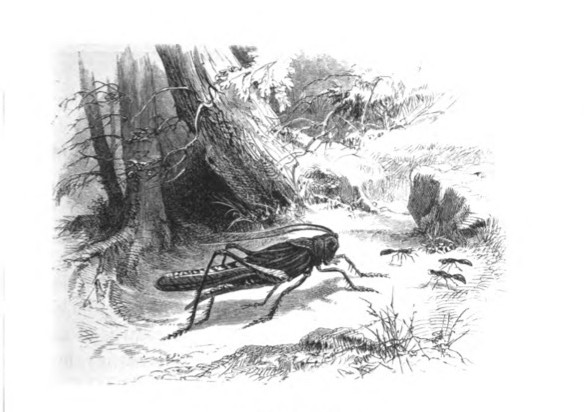The Ant and the Grasshopper
By Aesop
Annotations by Jessica ABell

In the winter season, a commonwealth of Ants was busily employed in the management and preservation of their corn, which they exposed to the air in heaps round about the avenues of their little country habitation. A Grasshopper, who had chanced to outlive the summer, and was ready to starve with cold and hunger, approached them with great humility, and begged that they would relieve his necessity with one grain of wheat or rye. One of the Ants asked him, how he had disposed of his time in the summer, that he had not take pains, and laid in a stock, as they had done?–“Alas, gentlemen,” says he, “I passed away the time merrily and pleasantly, in drinking, singing, and dancing, and never once thought of winter.”–“If that be the case,” replied the Ant, laughing, “all I have to say is, that they who drink, sing, and dance in the summer, must starve in winter.”
APPLICATION.
As summer is the season of the year in which the industrious and laborious husbandman gathers and lays up such fruits as may supply his necessities in winter, so youth and manhood are the times of life which we should employ and bestow in laying in such stick of all kind of necessaries as may suffice for the craving demands of helpless old age. Yet, not withstanding the truth of this, there are many of those which we call rational creatures, who live in a method quite opposite to it, and make it their business to squander away in profuse prodigality whatever they get in their younger days: as if the infirmity of age would require no supplies to support it; or, at least, would find them administered to it in some miraculous way. From this fable we learn this admirable lesson, never to lose any present opportunity of providing against the future evils and accidents of life. While health and the flower and vigor of our age remain firm and entire, let us lay them out to the best advantage, that, when the latter days take hold of us and spoil us of our strength and abilities, we may have a store moderately sufficient to subsist upon, which we laid up in the morning of our age.
Aesop. The Fables of Æsop with a Life of the Author /. Boston :, c1865., http://hdl.handle.net/2027/chi.18810389.
Contexts
“The Ant and the Grasshopper” is a well-known Aesop fable. Aesop’s fables are tales that often contain lessons to teach the reader. Similar to morals lessons that are often featured in fairy tales.
Resources for Further Study
Pedagogy
- Lesson Plan for “The Ant and the Grasshopper” for third grade.